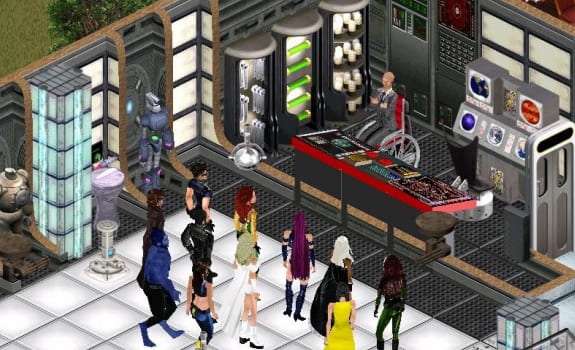Last Autumn I had the pleasure of being interviewed by Dr. Matt Finch, as part of his ongoing column in CILIP’s Information Professional magazine. Matt’s column explores new notions of literacy in the 21st century, and, in a world where many young people learn to navigate digital and online spaces through fandom, we were able to discuss how ‘fan literacy’ is one of the most important ways that information literacy is achieved particularly among younger generations of internet users. Yet information literacy is rarely discussed in these terms.
My interest in the liminal spaces between fandom and LIS really began in 2009, when I joined an online fan community for The Sims computer game, called CTO Sims (sadly now defunct). Apart from the main forum, there was also an archive of sorts – a space where fan-made custom content from this old game was collected, stored, and curated. Over time, I became an administrator and informal ‘archivist’ of the site, and it never ceased to amaze me how information literate we all were as a community – even though I never thought about it in terms of information literacy at the time. Some of us would go on ‘rescue missions’, downloading custom content en masse before the host site could go down, using rudimentary tools such as the DownThemAll Firefox extension. If a site had already gone down, we’d see what we could salvage using the Wayback Machine. We arranged everything in our archive according to site, function, and type. It was digital archivism. All done by passionate fans and amateurs.
But CTO Sims was much more than this. As a community it was a place to share, to learn, to teach. People wrote tutorials and FAQ’s. Members came together to build beautiful, virtual worlds in monthly contests, and celebrated events by gifting the custom-content they had made. Others created themed rec lists, pointing members in the direction of the best sites to find what they wanted for their builds. And the old-timers mentored the ‘newbies’ in the skills they’d taught themselves over the years.
I learned how to mesh and create game assets through the CTO Sims community. I wanted X-Men for my Sims game, and there weren’t any, so I had to learn how to make them myself. And when I couldn’t find all the appropriate items to build the Danger Room in my virtual Xavier Institute, I had to learn to make those items myself too. These are not soft skills. These are hard, tech skills, ones that I learned not by going on a course, but by reading the tutorials written by fellow fans, by the mentoring of those in the community who had also had to teach themselves. And what we created, we shared. We announced them with pride. We turned our new skills into making gifts for the rest of the community, uploading them to the archive so anyone could download them.
When I started my Library Science Masters at CityLIS, I began to see the overlaps between what we were doing in CTO Sims and LIS. That overlap, between passionate fandom and LIS, became the foundation of my Masters dissertation, which ended up being a virtual ethnography of the information behaviour within CTO Sims. What I found was that CTO Sims was an information eco-system, in complex and exciting ways – informal and non-proscriptive ways, to be sure – but in a manner that was rich and vibrant. And as I continue on my journey both as a fan and as an information professional, I see that richness, that vibrancy, throughout the fan communities I inhabit.
As I explained to Matt, fandom is place where new kinds of expertise are developed, ones that can rise to challenges and problems in new and innovative ways. Being a fan doesn’t necessarily mean you are a qualified computer science professional, but it doesn’t stop you from coming together with other fans to build a tagging system that does away with most of the inherent messiness of traditional folksonomies, and is probably the envy of many a professional subject heading authority. It doesn’t stop you from using your language skills to create scanlations (fan-made translations) of manga for fellow fans. It doesn’t stop K-pop stans from using their fancams to protest far right political discourse on Twitter. And it doesn’t stop Sims fans from teaching the community how to game mod.
This is what I mean by ‘fan literacy’ – fandom isn’t merely a place to squee and geek out (though there is that). It’s a place to learn to navigate the digital world in a way that is sometimes completely outside the box. You don’t solve problems because you have to – you solve them because you want to, sometimes obsessively so. You don’t go looking for information because it’s work; you do it because it’s play. Fan literacy, fan information literacy, is pleasurable, sociable, generous and ludic. And it sticks. Because it satisfies a core need within us – the need to create… and the need to belong.
You can read Matt Finch’s column on fan literacy in the Jan-Feb 2021 issue of Information Professional; or you can listen to our hour-long interview here.
This post was originally posted on the CityLIS FanLIS project blog.
